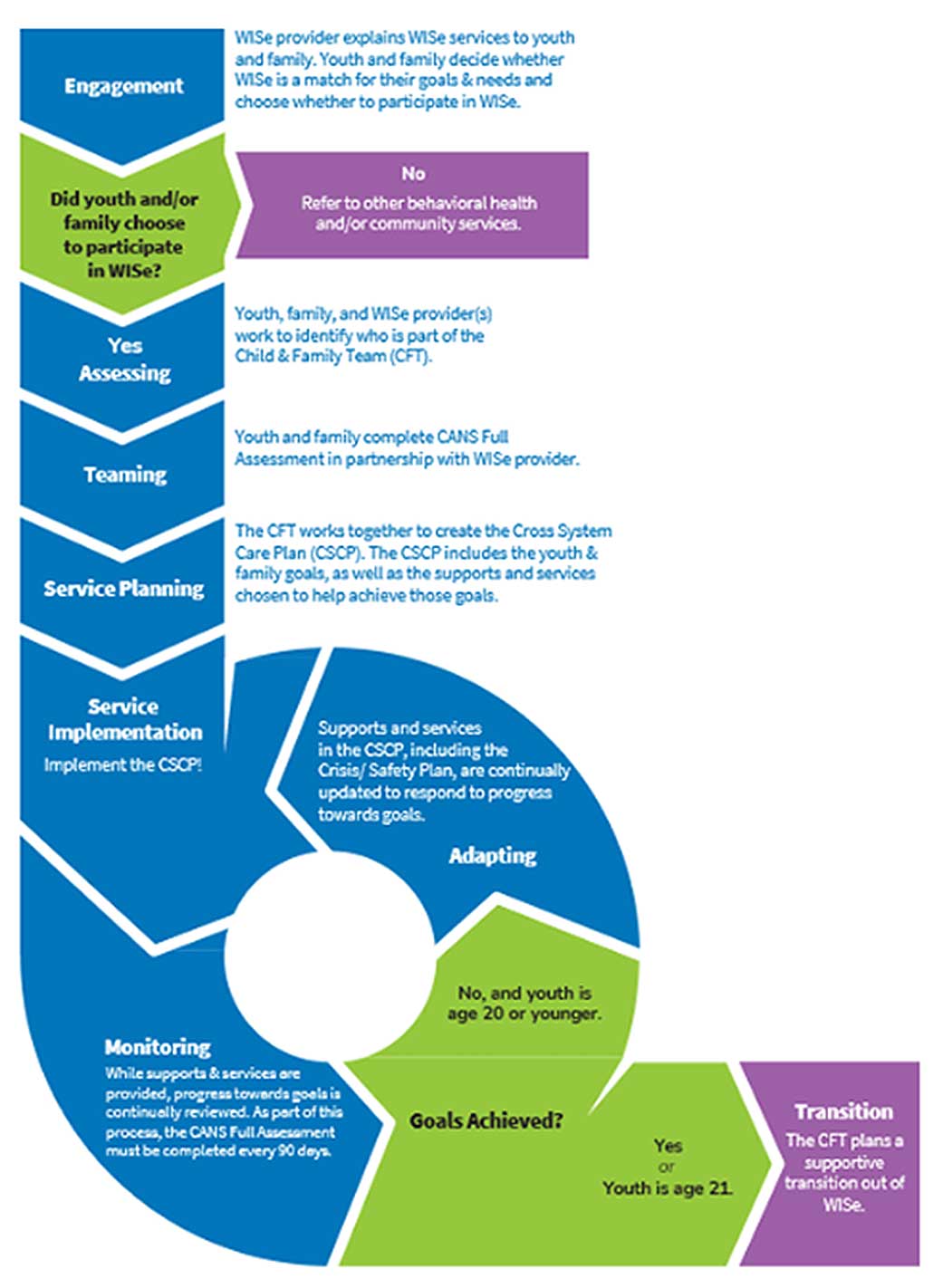WISe Services
Wraparound Intensive Services WISe
Are you ready to take the first step with WISe?
Your Voice
Your Choice
Nothing without you!
What is WISe
Wraparound with Intensive Services (WISe) is an innovative therapy approach to helping children, youth, and their families with intensive mental health care. This program is based on a team approach to care that is guided by the youth and families’ voice and choice.
It includes individual therapy and family sessions, care coordination, and peer support services. The goal is to prevent out-of-home placement whenever possible. Enrolled families are assigned a Care Coordinator, Family and/or Youth Partner and Mental Health Clinician.
Eligibility
Referrals are recommended but not required.
- Have Medicaid or be Medicaid eligible.
- Be between the ages of 0-20
- Complete a Child Adolescent Needs and Strengths assessment.
- This can be completed over the phone or in-person.
Crisis Response
We offer crisis services to help both the youth and their family. This can include making plans to prevent crises, providing support over the phone, and offering face-to-face interventions when needed.
Your Team Members
Youth Partner
The Youth Peer Partner is a person who helps young people with navigating different systems and groups. They set a good example for the youth and make sure the youth’s opinions are considered in every step. The Youth Peer Partner supports the youth in feeling more confident, promotes healthy relationships, and helps others working with the youth understand their culture. They also share their own story to teach through their experiences.
Family Partner
The Family Peer Partner is a person who helps caregivers directly. They make sure families get to have a say in everything and connect them with other families and support groups. The Family Peer Partner also encourages caregivers to take care of themselves and helps them figure out and understand different systems. They give information about services for kids, mental health, and other resources in the community. The Family Peer Partner also shares their own story to teach through their experiences.
Care Coordinator
The Care Coordinator is a key person in supporting youth and families. They lead monthly meetings called Child Family Team (CFT) meetings to create a plan, using an assessment called the Child Adolescent Needs and Strengths (CANS) every 90 days to check how well the plan is going. The Care Coordinator knows a lot about local resources like housing, mental health, and education and can use them when needed. They also attend meetings with other helpers, like schools and housing providers, to make sure everyone is working together.
Mental Health Clinician
The Clinician is a key person who helps youth with their mental health. They deal with urgent mental health needs, respond to crises, and make sure the treatment and safety plans are followed. The Clinician turns team decisions into therapy goals and provides therapy for individuals or families when needed. They use their judgment and expertise in all stages of the WISe process. The Clinician also helps the youth, their family, and the team understand treatment needs.

The Six Phases of WISe
1 - Engagement
During this phase, the groundwork for trust and shared vision among the youth, family, and WISe team members is established. The team follows Washington State Children’s Behavioral Health Principles, focusing on strengths, needs, and culture. In addition, this phase begins to shift the youth and family’s orientation to one in which they understand they are an integral part of the process.
2 - Assessing
In this continuation of the engagement phase, the WISe Practitioners expand the discussion with the youth and family to add context. The WISe Practitioners (Care Coordinator, Family Peer, Youth Peer, and Mental Health Therapist) help the youth and family understand that their input is central to the WISe process and that their perspectives and preferences will be prioritized. This includes helping the youth and family understand and incorporate any legal mandates into their plan. A WISe Practitioner completes and reviews the results of the Full Child Adolescent Needs and Strengths (CANS) within 30 days of enrollment into WISe.
3 - Teaming
In this continuation of engagement and building on the assessing phase, the WISe Practitioners help the youth and family identify and reach out to persons who should be part of the WISe Child and Family Team (CFT). The team is essential to successful planning and intervention and creation of the Cross System Care Plan (CSCP).
4 - Service Planning and Implementation
During this phase, mutual trust and respect is developed using a high-quality planning process called the Cross System Care Plan. During this phase youth and family should feel that they are heard, they have clarity on their goals, and the options will captalize on strengths. The team also reviews and expands the crisis plan to reflect proactive and graduated strategies to prevent future crisis. crisis, or to respond to them in the most effective and least restrictive manner.
5 - Monitoring and Adapting
The Cross System Care Plan is implemented. Progress and success are continually reviewed, and necessary changes to the plan are made. The team maintains cohesiveness and mutual respect. The activities of this phase are repeated until the team’s mission is achieved.
6 - Transition
This phase helps to transition youth to a lower level of care. The goal of this phase is to identify an “end date” that supports rather than abandons the family and assists them with moving into a life free from system interference.
Ready to Take the First Step?
Take the first step towards transformative mental health care—enroll now in WISe and gain access to personalized support, coordination, and resilience-building for you or your loved one facing challenges.
Ten Principles of WISe
Family and Youth Voice and Choice
Family and youth voice, choice, and preferences are intentionally elicited and prioritized during all phases of the process, including planning, delivery, transition, and evaluation of services. Services and interventions are family-focused and youth-centered from the first contact.
Team-based
Services and supports are planned and delivered through a multi-agency, collaborative team approach. In addition to the WISe practitioners, team members are chosen by the family and the youth to support connectedness through natural, community, and formal support and service relationships. The team works together to develop and implement a plan to address unmet needs and work toward the youth’s and family’s vision.
Natural Supports
The team actively seeks out and encourages the full participation of team members drawn from the youth’s and family members’ networks of interpersonal and community relationships (e.g. friends, neighbors, community, and faith-based organizations). The care plan reflects activities and interventions that draw on sources of natural support to promote recovery and resiliency.
Collaboration
The system responds effectively to the behavioral health needs of multi-system involved youth and their caregivers, including youth in the child welfare, juvenile justice, developmental disabilities, substance abuse, primary care, and education systems.
Home and Community-based
Youth are first and foremost safely maintained in, or returned to, their own homes. Services and support strategies take place in the most inclusive, most responsive, most accessible, most normative, and least restrictive setting possible.
Culturally Relevant
Services are culturally relevant and provided with respect for the values, preferences, beliefs, culture, and identity of the participant/youth and family and their community.
Individualized
Services, strategies, and supports are individualized and tailored to each youth and family's unique strengths and needs. They are altered when necessary to meet changing needs and goals or in response to poor outcomes.
Strengths-Based
Services and supports are planned and delivered in a manner that identifies, builds on, and enhances the capabilities, knowledge, skills, and assets of the youth and family, their community, and other team members.
Outcome-based
Based on the youth and family’s needs and vision, the team develops goals and strategies, ties them to observable indicators of success, monitors progress in terms of these indicators, and revises the plan accordingly. Services and support are persistent and flexible so as to overcome setbacks and achieve their intended goals and outcomes. Safety, stability, and permanency are priorities.
Unconditional
A youth and family team’s commitment to achieving its goals persists regardless of the youth’s behavior, placement setting, family circumstances, or availability of services in the community. The team continues to work with the family toward their goals until the family indicates that a formal process is no longer required.
